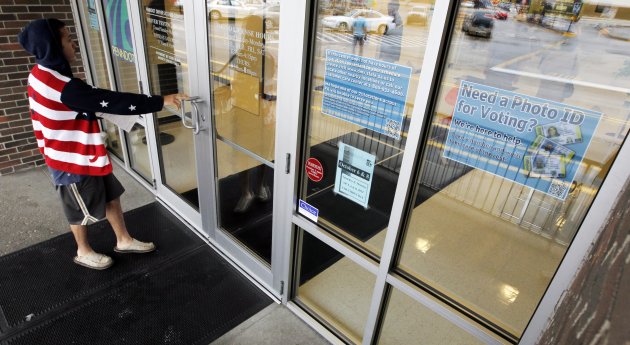By CARLA K. JOHNSON and PATRICK CONDON

Andrew Engeldinger's parents pushed him for two years to seek treatment for what they suspected was mental illness, but even though he became increasingly paranoid and experienced delusions, there was nothing more they could do.
Minnesota
law doesn't allow people to be forced into treatment without proof that
they are a threat to themselves or others. Engeldinger's parents were
horrified last week, when their 36-year-old son went on a workplace
shooting spree that led to the deaths of a Minneapolis sign company's
owner, several of his employees and a UPS driver. Engeldinger then
killed himself.
"They wanted him to get treatment. They wanted him to get help," said Sue Abderholden, the executive director of the Minnesota
chapter of the National Alliance on Mental Illness, who has acted as a family spokeswoman.
She added: "You're not going to convince someone they're ill if they don't want to believe it."
This
is a problem faced by many friends and relatives of people suffering
from mental illness, along with the police officers and health care
providers to whom they turn for help. While a small number of people
with mental illness commit acts of violence, the difficulty of securing
treatment and ensuring it is successful — and the catastrophic
consequences of failure — are common threads that often link such
outbursts.
"These are not random acts of violence," said Dr. E. Fuller Torrey,
a psychiatrist at the nonprofit Stanley Medical Research Institute in
Maryland. "It is my personal belief that these episodes will increase in
number and severity and will continue until we figure out what to do
about it."
Engeldinger was
never formally diagnosed with a mental illness, but his family was
concerned enough by their son's behavior, which included claims that he
was being followed, to enroll in a free, 12-week course for loved ones
of people with mental illness before he cut off contact in late 2010.
His
willful estrangement kept his parents from the basement of his small
bungalow, where police said he stockpiled 10,000 rounds of ammunition
and a second gun on top of the 9mm Glock semi-automatic pistol he used
in Thursday's shooting. Without evidence that he was a threat to himself
or others, they were unable to force him into treatment under Minnesota law.
A
successful patients' rights movement in the 1970s made it difficult —
and illegal in some states — to force a person into treatment unless he
or she was homicidal or suicidal. Dr. Darold Treffert, a Wisconsin
psychiatrist, coined the phrase "dying with their rights on" in 1974,
after collecting stories of people who didn't qualify for involuntary
commitment and later killed themselves.
In the years since, 41
states have added "need for treatment" standards to their laws that
allow more individuals to be placed into court-ordered treatment
programs. Minnesota is not among them.
"The pendulum is slowly
returning to a reasonable balance," Treffert said. "I have comforted
myself on this long mission with the realization that some things can be
learned and can't be taught. We do seem to be learning slowly from
tragedies."
A sly suggestion from a police officer led Kevin Earley's
father to lie and say the young man was violent so that he would get
treatment. Earley, then 23, was arrested after breaking into someone
else's house to take a bubble bath.
"He
said, 'Unless you tell them your son threatened to kill you, they won't
admit him and we'll take him to jail, and you don't want that,'" said Pete Earley, an author in Fairfax, Va., who has written about his son's experience in the mental health care system.
Kevin
Earley was seeing secret messages all around him, but his father never
heard his clearly psychotic son threaten himself or others.
"I went in and I lied. And that got him into the hospital," Pete Earley said.
But
just getting patients diagnosed or enrolled in treatment often isn't
enough. Virginia Tech gunman Seung-Hui Cho was ordered into outpatient
treatment before he killed 32 people in 2007.
This summer,
prosecutors say, James Holmes killed 12 people at a midnight premiere of
a new Batman movie in Colorado. His attorneys say he had an undisclosed
mental illness, and his psychiatrist tried to report him to a campus
behavioral and security committee.
Experts
say it can take years before patients agree to stick with a prescribed
treatment. Elyn Saks, a law professor at the University of Southern
California, has schizophrenia and, without medication, starts to believe
she can kill hundreds of thousands of people with her thoughts. Until
the mid-1990s, when she was in her 40s, Saks tried periodically to skip
her drugs.
"I felt so ashamed," said Saks, a MacArthur Foundation "genius grant" winner for her contributions to mental health law.
"It's an internalized stigma. I wanted to be whole, I wanted to be
well. Each time I tried to get off medication, I did it with great gusto
and failed miserably." Now, she takes her pills. "Frankly, I'm sorry I
wasn't smarter sooner."
Earley
initially didn't stick with treatment after his father lied to get him
into a hospital. He became violent — he was shot with a Taser by a
police officer at one point — and was hospitalized five times before he
realized he couldn't live without his medication.
"I
know I have a mental illness and if I leave it untreated it will
destroy me," said Earley, who now works full time as a peer counselor in
Fairfax County, Va., helping others with severe mental illnesses. With
treatment, he said, "I have my own apartment, a car ... I'm able to do
things with friends and family. I have a job I can go to that gives me
pride."





 The news that we may be seeing the beginning of a mass exodus of
donors from the Romney campaign comes from a surprising source,
The news that we may be seeing the beginning of a mass exodus of
donors from the Romney campaign comes from a surprising source, 




 You
know Bill Nye -he's the Science Guy! But he wasn't always. It was a
series of what might appear to be happy coincidences that landed him in
the position of pop culture science teacher. But happy coincidences are
often just the result of someone who leaps at the right opportunities.
Fast Company has an interview with Nye in which he tells how he worked
as an airplane engineer while his friends thought he should be the next
Steve Martin. At one time he was working with a radio DJ.
You
know Bill Nye -he's the Science Guy! But he wasn't always. It was a
series of what might appear to be happy coincidences that landed him in
the position of pop culture science teacher. But happy coincidences are
often just the result of someone who leaps at the right opportunities.
Fast Company has an interview with Nye in which he tells how he worked
as an airplane engineer while his friends thought he should be the next
Steve Martin. At one time he was working with a radio DJ. These are not great times for coral reefs around the world. Coral reefs in the Caribbean are collapsing due to climate change and this new report from Australia is bad news as well.
These are not great times for coral reefs around the world. Coral reefs in the Caribbean are collapsing due to climate change and this new report from Australia is bad news as well.  Coral
cover in the Great Barrier Reef has dropped by more than half over the
last 27 years, according to scientists, a result of increased storms,
bleaching and predation by population explosions of a starfish which
sucks away the coral’s nutrients.
Coral
cover in the Great Barrier Reef has dropped by more than half over the
last 27 years, according to scientists, a result of increased storms,
bleaching and predation by population explosions of a starfish which
sucks away the coral’s nutrients.
